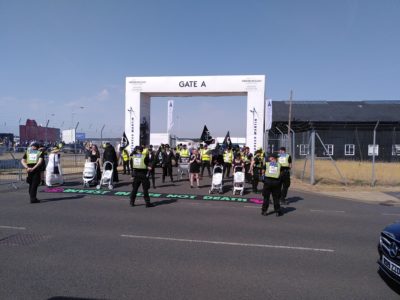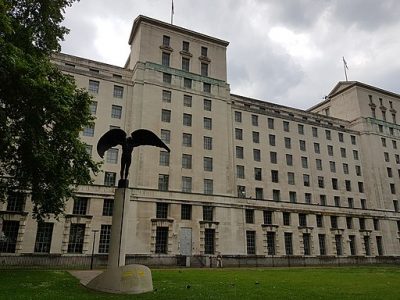‘Alternative Provision with a Military Ethos’ receives more funding – our response
ForcesWatch comment
On 7 December 2014, Michael Gove’s successor as Secretary of State for Education Nicky Morgan made her support for the Military Ethos in Schools programme clear by pledging a further £4.8 million to eight ‘alternative provision with a military ethos’ schemes. This follows previous funding between 2012 and 2014 that amounted to £8.2 million. The Quakers have written a letter with their concerns about the new announcement to Nicky Morgan, which can be read here.
Below are our key initial concerns.
Background
On 7 December 2014, Michael Gove’s successor as Secretary of State for Education Nicky Morgan made her support for the Military Ethos in [English state] Schools programme clear by pledging a further £4.8 million to eight ‘alternative provision with a military ethos’ schemes. This follows previous funding for military ethos alternative provision projects between 2012 and 2014 that amounted to £8.2 million, and the recently-announced additional £8.7m for the Troops to Teachers scheme and £2.3m for new Combined Cadet Forces. Other military-style alternative provision also exists, such as the Lancashire County Council’s ex-Service Personnel Mentoring Programme, and Military Skills Centres and the UK Military School.
ForcesWatch have previously raised concerns over the government’s funding of alternative provision with a military ethos, noting that by targeting those children who are most disadvantaged within society, these militarised initiatives may restrict children’s options, even channelling them into the armed forces. Furthermore, being co-ordinated by armed forces veterans, it is debatable to what extent alternative provision with a military ethos provides a balanced insight into life in the armed forces. Implicit within alternative provision with a military ethos is the assumption that the ‘ethos’ of the armed forces makes veterans particularly qualified to develop young children and improve their life-chances. In reality, this assumption needs examination, especially considering the ample claims of bullying, sexual harassment, and human rights abuses that are regularly levied against the armed forces. Whilst some armed forces veterans may make excellent mentors for students, these qualities are not conditional on their socialisation within the military, and many civilians, in other public services for example, will possess resimilar qualities. Finally, we question whether this is really all about raising educational attainment. Are there wider agendas at work and are military-based activities appropriate within education?
Lack of evidence to justify the extra funding
This recent round of funding is to be implemented on the basis of claims from the Department for Education that alternative provision with a military ethos ‘can have a positive impact in improving behaviour, attendance and resilience for the young people taking part allowing them to get the most out of school.’ However, there is little evidence to support this claim. Indeed, the independent TNS BMRB report commissioned by the DfE, and used to support this recent funding, acknowledges that their report ‘was not designed as, nor intended to be, a rigorous evaluation of the Military Ethos AP projects of the programme as a whole’. Yet extraordinary financial resources are still being granted to schemes that offer military-based activities to those who are most disadvantaged within British society.
Claims regarding the positive impact of alternative provision with a military ethos are principally based on the monitoring and evaluation information submitted by the six providers of military-based alternative provision who will directly benefit from this new round of funding. However, the TNS BMRB report acknowledges that the information submitted by these providers is subject to a litany of methodological, sampling and reporting errors. For example, those submitting information ‘were not required to evaluate their projects and few had any prior research experience or in-house expertise to draw upon in designing or conducting evaluations’.
The report also admits that, ‘The sample size (or number of pupils involved) in the evaluations undertaken was typically small leading to concerns around the potential margin of error in reported impacts’. In addition, it states that the ‘quality of questions asked by providers/evaluators was variable within and between organisations. There were instances of leading questions evident in feedback forms and open questions were not always asked of participating pupils.’
The report also recognises that other factors could account for perceived improvements in attainment, attendance and behaviour. Notably, teachers acknowledged that a range of behavioural initiatives that were implemented concurrent to alternative provision with a military ethos could have accounted for improvements.
The report also asserts that alternative provision with a military ethos might not directly contribute to improved educational attainment:
‘Projects were viewed as a means through which to support resilience, self – confidence and inter-personal skills, which were in turn assumed to have a beneficial impact on attainment. For the most challenging pupils, simply promoting their engagement in school was seen as a key outcome regardless of whether the project then led to improvements in attainment or the achievement of additional qualifications. As such any impact on attainment that was perceived or evidenced was seen to be indirect, resulting from changes to attendance, behavior or resilience.’ (italics added)
It should be noted that a plethora of alternative provision schemes aim to install these qualities within children without resorting to military-style approaches. Indeed, Nicky Morgan’s predecessor Michael Gove himself admitted, when championing the Military Ethos in Schools programme, that ‘These qualities are of course not exclusive to the military. In the UK we have a strong tradition of youth uniformed organisations, such as the Girlguiding UK and the Scout Association, or St John’s ambulance and the Boys and Girls Brigades, who have an excellent track record of developing young people from a variety of backgrounds.’ Nicky Morgan is unconvincing when speaking in a video interview on how military veterans are better-placed than other education staff to improve disadvantaged students’ discipline and attainment.
Conclusion
With these concerns raised by the independent report commissioned by the DfE regarding alternative education provision with a military ethos, why is it that substantial sums continue to be directed towards these projects? Other agendas, such as recruitment into the armed forces, and giving young people a long-term positive view of the armed forces, seem to be at play. Nicky Morgan may have been ambivalent in her response to the recent Parliamentary question, ‘What can we do to ensure that local and national employers, particularly Her Majesty’s armed forces, get access to schools?’, but she clearly intends to continue the government’s policy of getting representatives of the armed forces into schools; she claims that “Schools already have a duty to ensure that young people are advised independently on all the options open to them”, but cites the armed forces along with the NHS, as “a huge source of career opportunities for our young people” who should be on the new Careers and Enterprise Company’s advisory board. Moreover, she acknowledges in a video interview that some of the disadvantaged students taking part in ‘alternative provision with a military ethos’ may be encouraged to join the armed forces as a result.
This renewal of funding for alternative provision with a military ethos represents a worrying trend by which the Government is elevating the military as guardians of the future of Britain’s most disadvantaged children, despite the potential risks and harms this could expose these children to, and despite the considerable lack of evidence to support the notion that this type of alternative provision really is in their best interests.
For comments and questions, please email education@forceswatch.net
See more: military in schools/colleges, education, military ethos
Like what you read?
> Sign up for our newsletter or blog notifications
> Support our work – from just £2 a month









